
Kangaroo Jack is a 2003 buddy comedy film directed by David McNally from a screenplay by Steve Bing and Scott Rosenberg with a story by Bing and Barry O'Brien. It is also produced by Jerry Bruckheimer with music by Trevor Rabin. The film tells the story of two childhood friends who get caught up with the mob and are forced to deliver $50,000 to Australia, but things go haywire when the money is lost to a wild kangaroo. It stars Jerry O'Connell, Anthony Anderson, Estella Warren, Michael Shannon, and Christopher Walken, with Adam Garcia as the uncredited voice of the titular character.

BMX Bandits is a 1983 Australian crime comedy action film directed by Brian Trenchard-Smith and starring Nicole Kidman.

Alexandra's Project is a 2003 Australian drama thriller film written and directed by Rolf de Heer and starring Gary Sweet and Helen Buday.

Bad Boy Bubby is a 1993 psychological absurdist black comedy film written and directed by Rolf de Heer, and starring Nicholas Hope, Claire Benito, Ralph Cotterill, and Carmel Johnson.
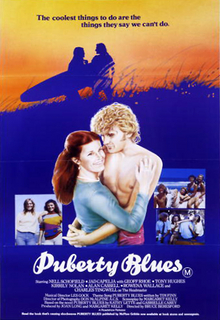
Puberty Blues is a 1981 Australian coming-of-age comedy-drama film directed by Bruce Beresford, based on the 1979 novel of the same name by Kathy Lette and Gabrielle Carey.

The Goddess of 1967 is a 2000 Australian film directed by Clara Law, who wrote the script with her husband Eddie Ling-Ching Fong. The film is about a rich young Japanese man, who travels to Australia with the intention of buying a Citroën DS car that he has found for sale on the internet. Once there, things do not go as planned and he ends up on a road trip with a blind girl.
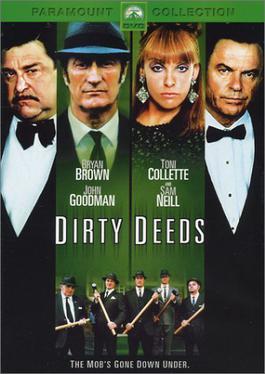
Dirty Deeds is a 2002 film shot in Australia. It was directed by noted fringe director David Caesar and stars Bryan Brown, Toni Collette, Sam Neill, Sam Worthington, John Goodman and Andrew Sommerich and produced by Nine Films and Television, the film and television production arm of the Nine Network, owned by PBL Media, now Nine Entertainment Co.
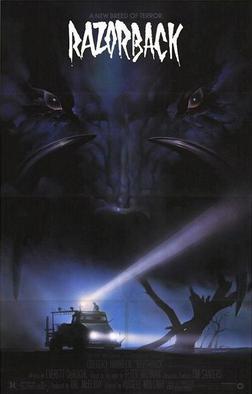
Razorback is a 1984 Australian natural horror film written by Everett De Roche, based on Peter Brennan's 1981 novel, and directed by Russell Mulcahy. The film revolves around the attacks of a gigantic wild boar terrorising the Australian outback, killing and devouring people. It was released theatrically in Australia by Greater Union Film Distributors on 19 April 1984, and in the United States by Warner Bros. on 16 November 1984.

Rolf de Heer is a Dutch Australian film director. De Heer was born in Heemskerk in the Netherlands but migrated to Sydney when he was eight years old. He attended the Australian Film, Television and Radio School in Sydney. His company is called Vertigo Productions and is based in Adelaide. De Heer primarily makes alternative or arthouse films. According to the jacket notes of the videotape, de Heer holds the honor of co-producing and directing the only motion picture, Dingo, in which the jazz legend Miles Davis appears as an actor. Miles Davis collaborated with Michel Legrand on the score.

The Tracker is a 2002 Australian drama film/meat pie Western directed and written by Rolf de Heer and starring David Gulpilil, Gary Sweet and Damon Gameau. It is set in 1922 in outback Australia where a colonial policeman (Sweet) uses the tracking ability of an Indigenous Australian tracker (Gulpilil) to find the alleged murderer of a white woman.
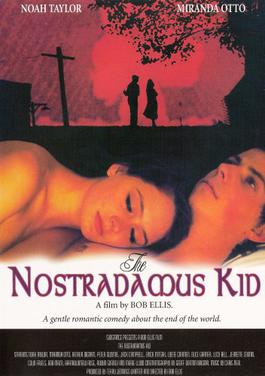
The Nostradamus Kid is a 1992 Australian feature film written and directed by Bob Ellis.
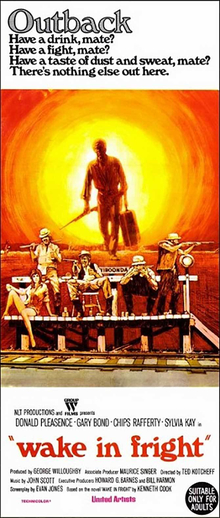
Wake in Fright is a 1971 Australian New Wave film directed by Ted Kotcheff, written by Evan Jones, and starring Gary Bond, Donald Pleasence, Chips Rafferty, Sylvia Kay and Jack Thompson. Based on Kenneth Cook's 1961 novel of the same name, it follows a young schoolteacher who descends into personal moral degradation after finding himself stranded in a brutal, menacing town in outback Australia.
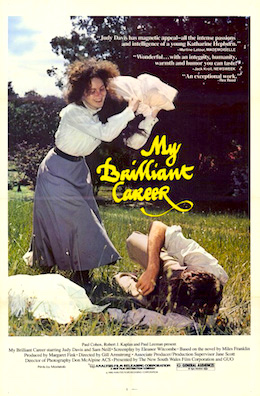
My Brilliant Career is a 1979 Australian period drama film directed by Gillian Armstrong, and starring Judy Davis, Sam Neill, and Wendy Hughes. Based on the 1901 novel of the same name by Miles Franklin, it follows a young woman in rural, late-19th-century Australia whose aspirations to become a writer are impeded first by her social circumstance, and later by a budding romance.
Monkey Grip is a 1982 Australian drama film directed by Ken Cameron. It is based on the novel, also titled Monkey Grip (1977), by Helen Garner. It was screened in the Un Certain Regard section the 1982 Cannes Film Festival. The film was produced by Patricia Lovell and stars Noni Hazelhurst and Colin Friels, and featured an original soundtrack by Australian rock band the Divinyls.

Spirits of the Air, Gremlins of the Clouds is a 1989 Australian independent science fiction adventure film directed, produced and written by Alex Proyas, who was making his first feature debut. Set in a post-apocalyptic world in which two siblings live in a homestead whose silence gets interrupted by a fugitive named Smith. Starring Michael Lake, Rhys Davis and Norman Boyd, the film was shot on location near Broken Hill, New South Wales and at Supreme Studios Sydney and was made with a budget of A$500,000.
Tudawali is a 1988 made for television biographical film about Aboriginal Australian actor Robert Tudawali. The screenplay was by Alan Seymour. It was directed by Steve Jodrell, and stars Ernie Dingo in the title role.

The Chant of Jimmie Blacksmith is a 1978 Australian drama film directed, written and produced by Fred Schepisi, and starring Tom E. Lewis, Freddy Reynolds and Ray Barrett. The film also featured early appearances by Bryan Brown, Arthur Dignam, and John Jarratt. It is an adaptation of the 1972 novel The Chant of Jimmie Blacksmith by Thomas Keneally.
Dad and Dave: On Our Selection is an Australian comedy film, based on the characters and writings of author Steele Rudd. It is set in late nineteenth century colonial Queensland, but largely filmed in Braidwood, New South Wales. The stories of the Rudds have been previously adapted for radio, television, and film. Geoffrey Atherden contributed to the screenplay with George Whaley, the latter of whom directed. This film featured numerous well-known Australian actors, such as Noah Taylor, Ray Barrett, Essie Davis, Murray Bartlett, Celia Ireland, Barry Otto, Nicholas Eadie, and future Oscar-winner Geoffrey Rush as the titular endearingly blundering son, Dave.

The Coolangatta Gold is a 1984 Australian film which led to the establishment of the iron man race The Coolangatta Gold.

Roadgames is a 1981 Australian thriller film directed by Richard Franklin and starring Stacy Keach and Jamie Lee Curtis. The film follows a truck driver travelling across Australia who, along with the help of a hitchhiker, seeks to track down a serial killer who is butchering women and dumping their dismembered bodies along desolate highways.
















